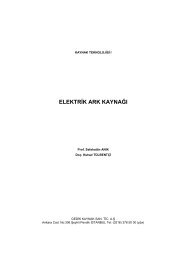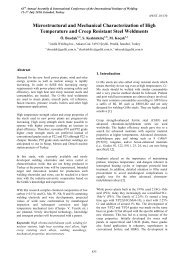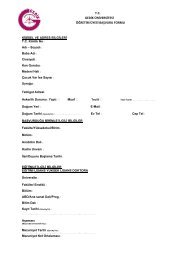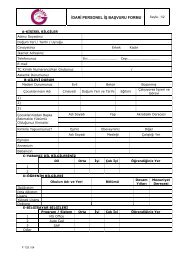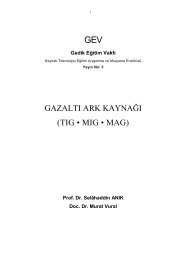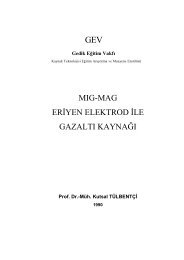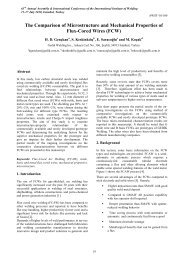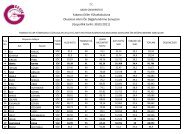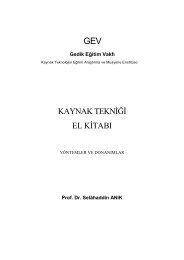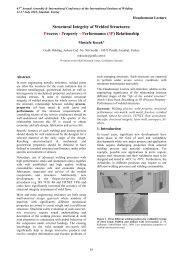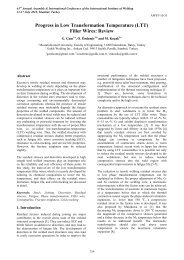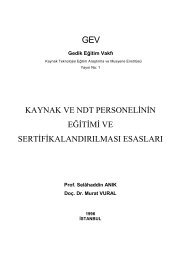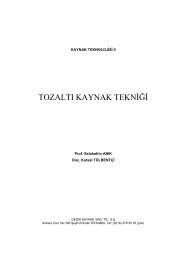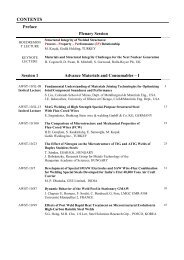Improving Global Quality of Life
Improving Global Quality of Life
Improving Global Quality of Life
Create successful ePaper yourself
Turn your PDF publications into a flip-book with our unique Google optimized e-Paper software.
structures. It is unlikely in the short term that such international standards will be developed and universally<br />
adopted. Rather, it is expected that a small number <strong>of</strong> product standards will be applied internationally for<br />
each industrial sector.<br />
Whilst this may be the case for the product standards, such standards rely on fabrication standards that<br />
may be stand-alone documents or a group <strong>of</strong> supporting standards that cover the essential areas where<br />
fabrication control is needed. These areas include, welding procedure development and qualification, the<br />
verification <strong>of</strong> welder skill, inspection requirements, dimensional and imperfection acceptance criteria, NDT<br />
techniques and requirements for the qualification <strong>of</strong> NDT operators amongst a range <strong>of</strong> supporting criteria.<br />
They also embrace the specification <strong>of</strong> base materials and welding consumables and the documentation <strong>of</strong><br />
knowledge to provide guidance on the avoidance <strong>of</strong> welding defects and the application <strong>of</strong> good practice in<br />
the fabrication activities carried out.<br />
IIW has already played an important role in the development <strong>of</strong> ISO standards for welding filler metals and<br />
ISO standards for testing <strong>of</strong> filler metals. A unique partnership has grown among IIW Commission II, ISO<br />
TC44 SC3 and CEN TC121 SC3 that has, in a few short years, produced a now nearly complete set <strong>of</strong> ISO<br />
filler metal standards. This partnership will continue to fill in the missing pieces to round out the portfolio<br />
<strong>of</strong> these standards, and momentum for adoption <strong>of</strong> these standards as national standards in major parts <strong>of</strong><br />
the world is building.<br />
IIW can play a pivotal role in developing certain <strong>of</strong> these supporting standards as well as promoting<br />
their adoption in regional and national standards that find global application. In developing this aim, the<br />
following strategies are identified:<br />
Developing in association with ISO/TC44, globally relevant, supporting welding standards where IIW<br />
has technical competence and is able to incorporate the development in its working programme.<br />
Preparation <strong>of</strong> technical, welding-related guides to enable users avoid making unsatisfactory welds<br />
where IIW has the competence to develop such guides and can include such projects in its working<br />
programme.<br />
Promotion <strong>of</strong> international supporting welding standards through the publication <strong>of</strong> articles in<br />
the technical literature, the submission <strong>of</strong> proposals to technical committees preparing product<br />
standards and the personal involvement <strong>of</strong> IIW member societies and working units with product<br />
standardising bodies.<br />
The preparation <strong>of</strong> IIW briefing documents giving explanations about international standards and<br />
encouraging their adoption by standardisation organisations in developing countries.<br />
7.4.10 Challenges in laws, standards and technical information<br />
All <strong>of</strong> the needs listed above require tackling appropriately. Some can be done quickly while others may take<br />
some time. All will be subject to evolution. At present we live in globally challenging times which will require<br />
our best thinking and endeavours to resolve with minimum harm to all.<br />
The challenges the world and the global welding industry face are:<br />
A) How are we to meet these needs which will vary from country to country? We all will need patience,<br />
tolerance, fair play and follow the rules, and need to recognise in making progress there:<br />
a) are usually many ways <strong>of</strong> tackling and solving problems;<br />
b) is rarely one universal optimum solution because <strong>of</strong> varying conditions;<br />
c) is usually a need for a proper balance and flexibility to achieve practical solutions and optimum<br />
compromises necessary for agreement;<br />
d) is the need for good leadership and management.<br />
70 <strong>Improving</strong> <strong>Global</strong> <strong>Quality</strong> <strong>of</strong> <strong>Life</strong> Through Optimum Use and Innovation <strong>of</strong> Welding and Joining Technologies



